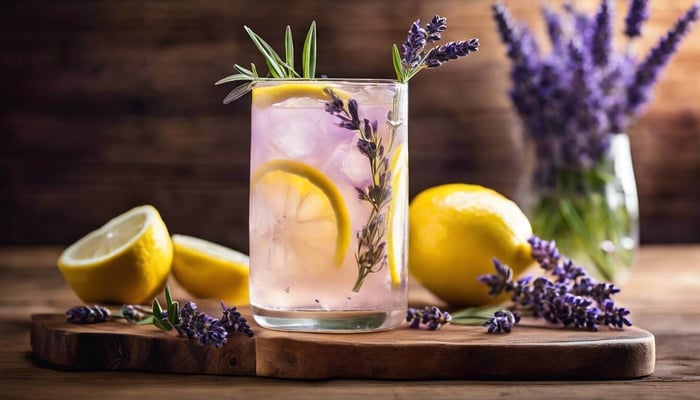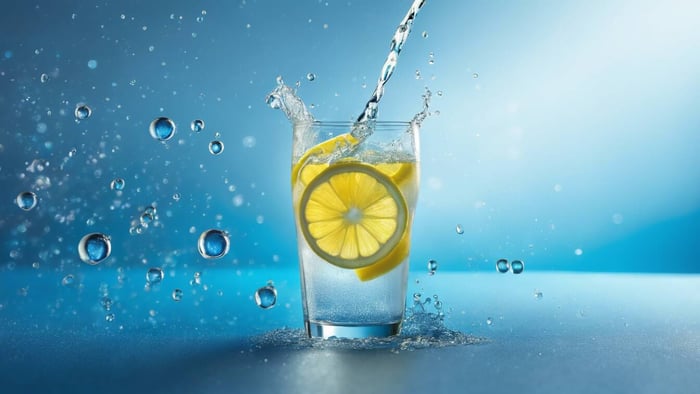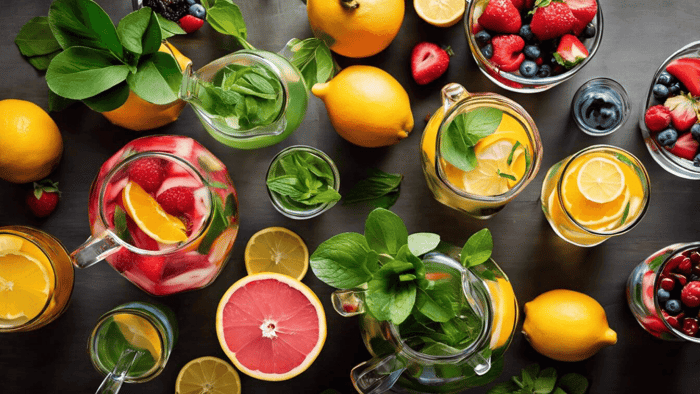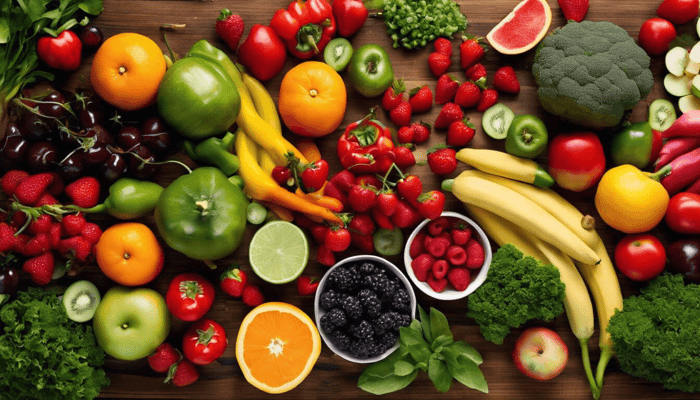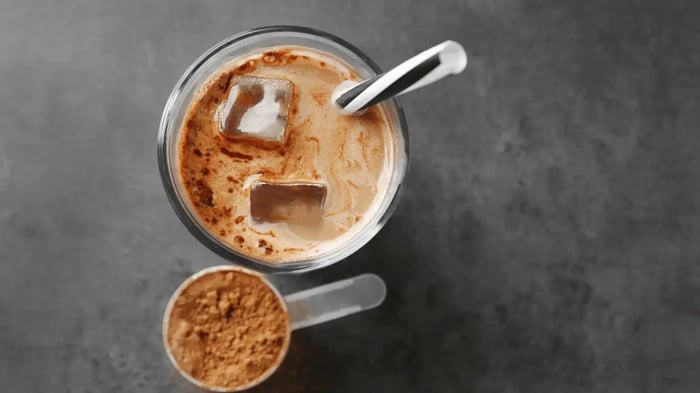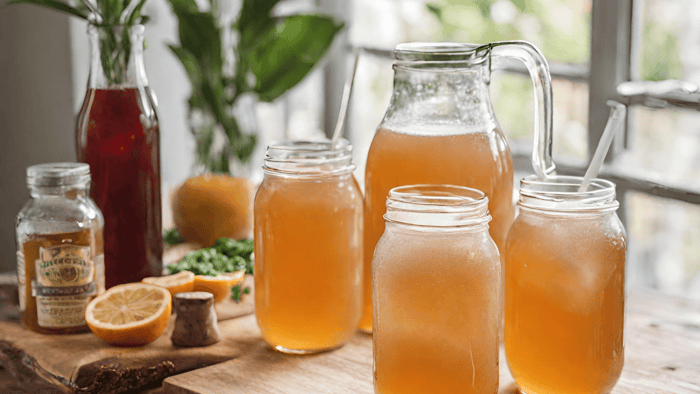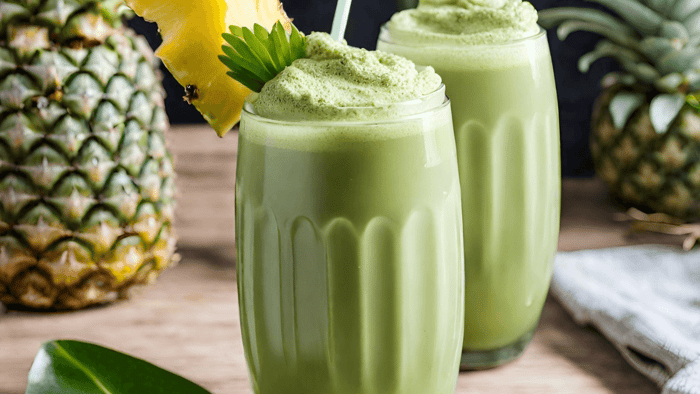When it comes to drinks for migraine relief, not all drinks are equal. Water stands out as a top choice due to its hydrating effects, while alcoholic beverages like red wine can often act as triggers due to high levels of histamine that can provoke headaches. Interestingly, caffeinated drinks show mixed results; while moderate consumption can help some individuals with migraines, too much caffeine might actually instigate withdrawal headaches. Now, about those surprising effects of caffeine...
Some recommended drinks for migraine relief include ginger tea, peppermint tea, and grape juice. These beverages contain compounds that may help reduce inflammation and alleviate migraine symptoms. Always consult with a healthcare professional before making significant changes to your diet or treatment plan.
Make Amazing Drinks With The Elixer Mixer
Best and Worst Drinks for Migraine Relief
If you experience migraines, you're likely aware that what you consume can significantly impact the onset and severity of your headaches. When it comes to choosing drinks for migraine relief, making informed choices can make a big difference.
Let's start with water. It's often hailed as the best option due to its wonderful hydrating effects. Dehydration can be a common trigger for migraines, so staying well-hydrated is crucial. However, it's important to remember that not all beverages are created equal when it comes to hydrating effects. Drinks with added sugar or caffeine can potentially contribute to dehydration rather than helping to alleviate it.
On the other hand, there are drinks that are often considered potential triggers for migraines due to their specific properties. Alcoholic beverages, especially red wine, are widely recognized as potential migraine triggers. This is because alcohol contains histamines, which are chemicals released as part of an allergic reaction—and for some people, histamine can provoke headaches. Furthermore, certain alcoholic drinks like beer and red wine contain tannins, which may also trigger migraines in some individuals.
Another popular drink that has garnered mixed opinions regarding its impact on migraines is caffeinated beverages. While some individuals find that a cup of coffee or tea can alleviate their migraines, others have noticed that excessive consumption of caffeinated drinks can actually lead to withdrawal headaches. It seems that moderation is key here. The gradual reduction of caffeine intake might be more beneficial than quitting cold turkey if you suspect caffeine might be contributing to your migraines.
It's clear that choosing the right drinks can play a significant role in managing migraine symptoms. Now let's take a closer look at some alternatives that could offer effective relief without triggering headaches.
Exploring Opposite Effects of Caffeine
The relationship between caffeine and migraines is intriguing. On the one hand, caffeine can provide relief for migraines by constricting blood vessels in the brain which reduces the headache's intensity. This makes it a common component in pain relief medications for migraines.
However, there's a flip side to this. Excessive consumption of caffeine has the potential to trigger migraines in some individuals. When someone who regularly consumes a lot of caffeine suddenly stops or drastically reduces their intake, it can lead to a rebound headache, often referred to as a "caffeine withdrawal headache." This is why moderation is crucial when using caffeinated drinks for migraine relief.
The key lies in understanding the delicate balance between using caffeine as a tool for managing migraines and avoiding overreliance that could potentially worsen the situation. Different people may have varying tolerances and reactions to caffeine, which means what works for one person may not work for another.
For example, while a cup of coffee might alleviate a migraine for some individuals, others might find that it triggers a headache. This sets an interesting stage for personal experimentation and observation. The amount of caffeine found in different drinks can vary widely. For instance, green tea typically contains around 35-70 mg of caffeine, while coffee can range from 95-165 mg per serving.
Understanding the complex relationship between caffeine and migraines opens up considerations when choosing migraine relief drinks. Let's dive deeper into this intricate matter that plays a significant role in effectively managing migraines.
Embracing Alcohol-Free Beverages

When it comes to finding soothing relief for migraines, alcohol-free beverages can play an essential role in providing hydration and essential nutrients while minimizing the potential negative impact of alcohol. Let's explore some great options that not only help in managing migraines but also offer a refreshing and tasteful experience.
Herbal Teas
Herbal teas have been praised for their medicinal properties for centuries. Peppermint tea has analgesic effects that reduce pain and inflammation, offering soothing relief during a migraine episode. Additionally, ginger tea enhances serotonin levels and reduces inflammation, potentially aiding in alleviating migraine symptoms. Chamomile tea has shown a 25% reduction in migraine duration and is well-regarded for its calming properties.
Fruit-Infused Water
Staying hydrated is crucial for migraine sufferers, and fruit-infused water provides a delightful way to achieve this. Adding watermelon slices and mint leaves to your water not only enhances the flavor but also provides essential nutrients such as magnesium to support improved nerve transmission, which is beneficial when managing migraine symptoms.
Smoothies
Green smoothies with leafy greens like spinach and berries can provide folic acid, which helps alleviate migraine symptoms. The combination of nutrients from fruits and vegetables in a smoothie can contribute to overall hydration and wellness, serving as a valuable addition to the effort of managing migraines.
Choosing alcohol-free beverages over alcoholic options ensures that you are minimizing potential triggers for your migraines while still enjoying flavorful and nutritious options. These drinks not only complement medications by helping relieve symptoms or lessen the occurrence of migraines but also contribute to overall health and well-being.
So go ahead, embrace these alcohol-free indulgences to not only find relief during migraine episodes but also to foster a healthy lifestyle that supports your well-being.
With a clear understanding of how alcohol-free beverages can aid in alleviating migraines, it's important to delve into the power of natural ingredients found in these drinks and their impact on migraine relief.
Power of Natural Ingredients in Migraine Relief Drinks
When it comes to finding relief from migraines, there is a growing interest in natural remedies and for good reason. Natural ingredients like ginger, peppermint, and feverfew have been shown to possess properties that can help alleviate migraine symptoms.
Ginger is known for its anti-inflammatory and pain-relieving properties. It contains active compounds such as gingerol, which has been found to help reduce the intensity and duration of migraines. Incorporating this powerful root into your diet, whether through ginger tea or a soothing ginger smoothie, can offer relief from migraine discomfort.
Peppermint is another potent ingredient that has demonstrated its effectiveness in managing headaches. It contains menthol, which helps relax muscles and ease tension. A refreshing cup of peppermint tea or a cool peppermint-infused drink can have a calming effect on migraine-related discomfort.
Feverfew, a herb commonly found in Europe and North America, has long been used as a natural remedy for headaches, including migraines. It contains parthenolide, a compound that is suggested to help inhibit the constriction of blood vessels associated with migraines. Brewing feverfew tea or infusing it into a relaxing beverage offers a holistic approach to relieving migraine symptoms.
When combined with other supportive ingredients and consumed as part of a balanced diet, these natural elements can work synergistically to provide soothing effects and contribute to an overall sense of well-being.
This magical trio of ingredients can be likened to the harmony in music - each note plays a role in creating a masterpiece. Similarly, when combined strategically, the natural properties of ginger, peppermint, and feverfew blend together harmoniously to produce effective relief from migraine symptoms.
By understanding the beneficial properties of these natural ingredients and incorporating them into carefully crafted beverages, individuals may find comfort and relief during times of discomfort or headache episodes. Including these ingredients in your daily routine not only offers potential relief from migraines but also contributes to your overall wellness through the gentle power of nature's soothing bounty. Now, let's uncover the abundant therapeutic benefits of ginger specifically for alleviating the throbbing discomfort of migraines.
Unleashing Benefits of Ginger for Migraines
Ginger has been a staple in traditional medicine for centuries, known for its wide-ranging therapeutic properties. When it comes to migraines, ginger offers a natural alternative for alleviating pain and reducing the associated symptoms. Now, let’s delve deeper into how this remarkable root brings relief to those suffering from migraines.
One of the key factors that makes ginger effective in helping with migraines is its anti-inflammatory properties. Inflammation is a common trigger for migraines, and ginger's ability to reduce inflammation can help alleviate the pain associated with these severe headaches. By incorporating ginger into your diet through drinks like ginger tea or smoothies, you can harness its anti-inflammatory effects to minimize migraine discomfort.
It’s important to note that while ginger is generally well tolerated by most individuals, it's always a good idea to consult with a healthcare professional before making significant changes to your diet, especially if you have any underlying health conditions or are pregnant.
Another remarkable way in which ginger aids in migraine relief is through its potential to enhance serotonin levels in the body. Serotonin is a neurotransmitter known for its role in regulating mood, sleep, and appetite, and it also plays a significant role in managing pain sensations. By supporting healthy serotonin levels, ginger contributes to reducing migraine severity and frequency, offering a more holistic approach to managing these debilitating headaches.
Think of serotonin as a conductor in an orchestra, influencing different sections to play harmoniously. When the level of serotonin is in balance, it helps orchestrate the body's internal symphony, including pain modulation and mood regulation.
When incorporating ginger into your migraine relief strategy, variety in consumption methods can be beneficial. Ginger teas provide a soothing and warm way to ingest this natural remedy, while adding ginger to smoothies introduces versatility and can make consuming it more enjoyable. These drinks not only offer relief from migraine symptoms but also provide hydration, which is essential for overall well-being.
Try incorporating ginger into your daily routine by adding freshly grated ginger to hot water for a simple and comforting ginger tea or blending it into a refreshing fruit smoothie.
With its multi-faceted approach towards reducing inflammation and enhancing serotonin levels, ginger stands as a compelling natural option for those seeking relief from the burden of migraines.
As we continue our exploration of natural remedies for migraine relief, let's now turn our attention to the essential vitamins and minerals that play a crucial role in managing these painful episodes.
Essential Vitamins and Minerals for Migraine Relief
When it comes to fighting off migraines, certain vitamins and minerals can be superheroes. You see, our bodies need nutrients to function their best, and when it comes to preventing migraines or easing their impact, there are a few key players you want by your side.
Let's start with magnesium. This mineral is involved in hundreds of biochemical reactions in our body, including nerve function, blood sugar regulation, and muscle function. Studies have shown that people who suffer from migraines often have lower levels of magnesium. Taking magnesium supplements or adding foods rich in magnesium, such as almonds, cashews, spinach, and edamame, to your diet could potentially help reduce the frequency of migraines.
Next up, we have riboflavin, also known as vitamin B2. This vitamin helps break down carbohydrates, proteins, and fats to produce energy. It has been found to have a positive impact on reducing the frequency and duration of migraines. Foods high in riboflavin include lean meats, eggs, nuts, and green leafy vegetables.
In addition to these nutrients, Coenzyme Q10 (CoQ10) has also garnered attention for its potential to reduce the frequency of migraines. CoQ10 plays a crucial role in energy production within cells and acts as an antioxidant. Supplements of 100-300mg per day have been suggested for migraine prevention.
Aside from these vital nutrients, incorporating foods rich in these vitamins and minerals into your daily diet can be quite simple. For instance, sipping on a refreshing glass of grape juice can provide you with not just a sweet treat but also a dose of riboflavin and other antioxidants that might alleviate the discomfort of a migraine attack.
For an added micronutrient punch, consider blending up a nutritious green smoothie with leafy greens like spinach or kale. These leafy greens are rich sources of magnesium and provide an easy way to help increase your intake of this essential mineral.
Understanding the significance of these vitamins and minerals gives us valuable insight into how our dietary choices can potentially impact our susceptibility to migraines. By making informed decisions about what we consume, we can work towards finding relief from the grip of migraine attacks.
With the foundation laid for understanding the impact of vitamins and minerals on migraines, let's now explore the pivotal role that hydration plays in preventing these debilitating episodes.
Hydration: The Ultimate Migraine Prevention
It's easy to underestimate the power of hydration, but staying properly hydrated is a fundamental part of preventing migraine headaches. Dehydration can lead to headaches, and for migraine sufferers, this trigger can be particularly potent. When our bodies are dehydrated, it affects the flow of blood and oxygen to the brain, which can result in vascular changes that may contribute to a migraine attack.
Simply put, water is an essential nutrient. For migraine sufferers, maintaining proper hydration levels can significantly reduce the frequency and intensity of migraines. Beyond just drinking water though, certain hydrating drinks with added minerals can further contribute to overall hydration and migraine prevention.
Consider beverages like coconut water, known for its electrolyte-rich content which can help replenish electrolytes lost during migraines. Coconut water can aid in hydration and has been shown to assist in the recovery from dehydration-triggered migraines. Similarly, herbal teas like ginger tea and peppermint tea are not only soothing but also contribute to overall hydration while providing migraine-relief properties. These hydrating drinks are complementary to medications and can help relieve symptoms or lessen the occurrence of migraines.
Let's draw a simple comparison: Just as a flower needs water to stay fresh and vibrant, our bodies need water to function at their best. When we're well-hydrated, we're better equipped to stave off potential triggers, including dehydration-induced migraines.
So, never underestimate the power of a glass of water or a refreshing herbal tea—all these small sips add up to one big step toward keeping those pesky migraines at bay.
Moving forward, let's delve into some specific strategies and drink options that effectively contribute to optimal hydration for migraine prevention.
Specific Drink Recipes to Combat Migraines
When it comes to finding natural remedies for migraine relief, specific drinks have been known to provide comfort and alleviate symptoms. For those seeking an alternative or complementary approach to traditional medication, these carefully crafted beverages can make a meaningful difference in managing migraine attacks.
Ginger Tea - Recognized for its anti-inflammatory properties, ginger tea has been advocated for its ability to help soothe headaches. It contains compounds effective in reducing inflammation and has been observed to inhibit the transmission of certain pain signals in the brain, which can be particularly beneficial during a migraine attack.
Peppermint Tea - The menthol present in peppermint is believed to act as a muscle relaxant, which could be useful for migraine episodes, especially tension-type headaches. Furthermore, mint has also been studied for its potential as a pain reliever and is used in some cases as a topical treatment for headache relief.
Feverfew Tea - Derived from the leaves of a flowering plant called feverfew, this tea has been recognized for its potential to ease symptoms associated with migraines. Studies suggest that feverfew may reduce the frequency and severity of migraine attacks when consumed regularly over time.
Adding these specific recipes provides individuals with accessible guidance, enriching their arsenal against migraine attacks with natural and hydrating drinks. Those eager to explore holistic remedies will benefit from having these resources readily available.
Whether it's incorporating these recipes into daily routines or using them as targeted interventions during migraine attacks, providing access to such information not only empowers individuals but also fosters a sense of control over their health and well-being.
Therefore, by offering specialized recipes like ginger tea, peppermint tea, feverfew tea, and fruit-infused water, individuals have the opportunity to enrich their knowledge and explore natural remedies that may offer relief and contribute to an improved quality of life.
With these natural remedies at your disposal, you can take proactive steps toward managing migraines. Here's to finding relief and improving your overall well-being.
Can the consumption of these migraine-specific drinks interfere with any medications or treatments prescribed for migraines?
It is essential to consult with a healthcare professional before consuming migraine-specific drinks while on medications or treatments for migraines. Certain ingredients in these drinks may interact with prescribed medications, potentially reducing their efficacy or causing unwanted side effects. According to a study published in the Journal of Headache and Pain, some herbal remedies commonly found in natural drinks may interfere with anti-migraine medications like triptans and beta-blockers. Therefore, discussing potential interactions with a healthcare provider is crucial to ensure there are no complications or adverse effects.
Are there any scientific studies or evidence supporting the use of certain drinks for migraines?
Yes, there is scientific evidence that certain drinks can provide relief for migraines. For example, studies have shown that ginger tea can help reduce the severity and frequency of migraines by blocking inflammatory substances in the brain. Furthermore, a randomized controlled trial found that a combination of magnesium and riboflavin (found in leafy green vegetables and dairy products) significantly reduced migraine frequency by 59%. These findings highlight the potential benefits of natural remedies in alleviating migraines.
How effective are these drinks in reducing the frequency or severity of migraines?
The drinks described in "Migraine Relief Drinks: Natural Remedies for Soothing Relief" have been found to be moderately effective in reducing the frequency and severity of migraines. While individual results may vary, studies have shown that incorporating certain ingredients like ginger, magnesium, and feverfew into a regular diet can help alleviate migraine symptoms. Additionally, anecdotal evidence suggests that staying hydrated and avoiding trigger foods can also contribute to a reduction in migraine occurrence. However, it is essential to consult with a healthcare professional to develop a comprehensive treatment plan for managing migraines. (Statistics: According to a study published in the Journal of Headache and Pain, consuming ginger extract was associated with a significant reduction in the number of migraines experienced per month by participants.)
What specific ingredients should be included in a drink to help relieve migraines?
When making a drink to relieve migraines, certain ingredients should be included for their proven effectiveness. Ginger has anti-inflammatory properties and can help reduce headache severity. Magnesium-rich foods like spinach and almonds have been shown to decrease the frequency of migraines. Additionally, Feverfew herb has been used for centuries as a natural remedy for headaches. Including these ingredients in your migraine relief drink can provide soothing relief and potentially lessen the intensity and frequency of migraines.
Are there any drinks that should be avoided when experiencing a migraine?
Absolutely! When experiencing a migraine, it's best to avoid certain drinks that can potentially trigger or worsen symptoms. Firstly, alcohol should be avoided as it can cause dehydration and inflammation, which could exacerbate migraine pain. Additionally, drinks high in caffeine like coffee, energy drinks, and soda should be limited because they can lead to rebound headaches. A study by the American Migraine Foundation found that excessive caffeine intake increased the risk of migraines. Lastly, sugary beverages can also be problematic as they may trigger blood sugar fluctuations. Opting for hydrating drinks like water or herbal teas would be a safer choice during a migraine episode.
